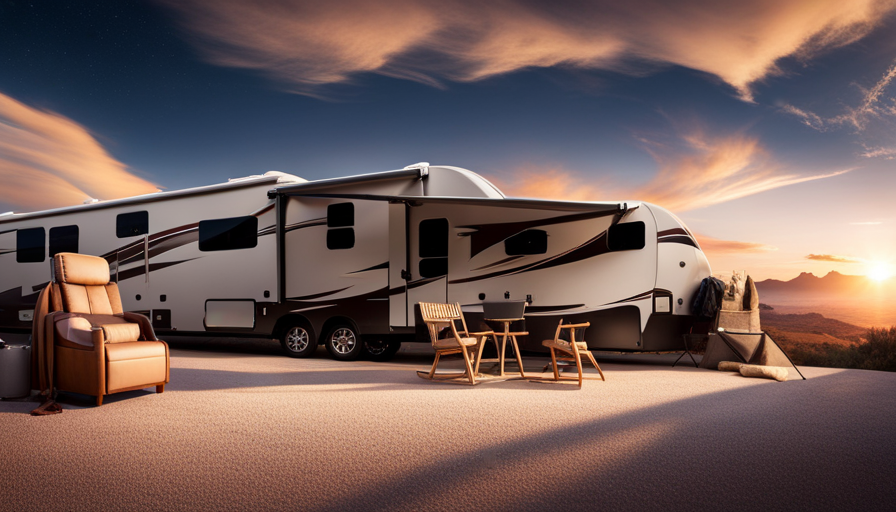Are you currently in the process of buying or selling a camper? If so, understanding the significance of a bill of sale is essential.
A bill of sale is a legal document that serves as proof of ownership and transfers the title of the camper from the seller to the buyer. It outlines the terms and conditions of the sale, ensuring that both parties are protected and aware of their rights and responsibilities.
In this article, we will guide you through the process of writing a bill of sale for a camper. We will provide you with the necessary information to include, as well as tips on using clear and concise language. Additionally, we will discuss the importance of understanding your state’s legal requirements and regulations.
So, let’s dive in and ensure a smooth and legally sound transaction for your camper sale!
Key Takeaways
- A proper bill of sale is crucial for a smooth transaction when buying or selling a camper.
- Understanding the legal requirements and regulations for your state is important when drafting a bill of sale for a camper.
- Consulting with an attorney specializing in transactional law can provide guidance and ensure compliance with legal requirements.
- To finalize the sale and exchange the bill of sale, schedule a meeting with the buyer and have both parties present, double-checking all the details before signing and dating the document.
Understand the Purpose and Importance of a Bill of Sale for a Camper
So, you’re about to sell your trusty old camper, huh? Well, let me tell you, having a proper bill of sale is absolutely crucial if you want to protect yourself and make sure the transaction goes smoothly.
It may seem like just a piece of paper, but the importance of documentation can’t be overstated. This legal document serves as proof of ownership transfer and outlines the terms and conditions of the sale. Without a bill of sale, you may encounter various complications down the road, such as disputes over ownership or unexpected liabilities.
By having a well-drafted bill of sale, you can ensure a smooth transaction. It provides clarity and transparency for both the buyer and the seller, clearly stating the agreed-upon price, payment terms, and any additional conditions of the sale. This not only protects you from potential misunderstandings or disagreements but also helps establish a record of the transaction for future reference.
Now that you understand the importance of a bill of sale, let’s move on to the next step of the process: gathering the necessary information for the bill of sale.
Gather the Necessary Information for the Bill of Sale
When gathering the necessary information for a bill of sale for a camper, we need to include key points such as buyer and seller information, camper details, and purchase price and payment terms.
The buyer and seller information should include their full names, addresses, and contact information.
Camper details should include the make, model, year, and vehicle identification number (VIN).
Lastly, the purchase price and payment terms should outline the agreed-upon amount and the terms of payment, whether it’s a lump sum or installment plan.
Buyer and Seller Information
To start off, you’ll want to include your contact information as the buyer and the seller in the bill of sale for your camper. This is crucial to establish the identities of both parties involved in the transaction.
Here are three key items to include in the bill of sale:
-
Full legal names and addresses of the buyer and seller
-
Contact phone numbers and email addresses of both parties
-
Government-issued identification numbers, such as driver’s license or passport numbers, to verify the identity of the buyer and seller.
Including this information ensures that the bill of sale is legally binding and can be used as proof of ownership.
Once you have provided the necessary buyer and seller information, you can move on to detailing the specific information about the camper being sold.
Camper Details
Now let’s dive into the exciting details about your awesome camper! When writing the camper details section of your bill of sale, it’s important to include specific information about the camper itself.
Start by providing details such as the make, model, year, and vehicle identification number (VIN) of the camper. Additionally, include any special features or upgrades that may be relevant to the sale.
It’s also a good idea to mention the current condition of the camper and any recent maintenance or repairs that have been done.
Lastly, don’t forget to emphasize the importance of camper insurance and remind the buyer to transfer their insurance coverage upon purchase.
Moving on to the next section about purchase price and payment terms, it’s crucial to establish a clear agreement between the buyer and seller.
Purchase Price and Payment Terms
Let’s now delve into the exciting part – the price and payment terms for your new adventure on wheels!
Negotiating the price of a camper can be an important step in the buying process. Consider researching the market value and condition of similar campers to ensure a fair deal.
When it comes to payment, there are various financing options available, such as bank loans or dealer financing. These options can help you spread out the cost over a period of time, making it more manageable.
Additionally, you may want to consider discussing the possibility of a down payment or trade-in to further negotiate the price. It’s important to carefully consider your budget and financial situation before making any decisions.
Moving forward, let’s now explore how to include specific terms and conditions in the bill of sale for your camper purchase.
Include Specific Terms and Conditions in the Bill of Sale
Ensure that the bill of sale for your camper includes specific terms and conditions that act as a roadmap to navigate the transaction, much like a reliable GPS guiding you on a long-awaited road trip.
These terms and conditions serve multiple purposes. Firstly, they establish the legal obligations and responsibilities of both the buyer and the seller. By clearly outlining the expectations, rights, and duties of each party, you can avoid any confusion or disputes that may arise during or after the sale.
Secondly, these terms and conditions protect both parties by ensuring that all aspects of the transaction, such as warranties, liabilities, and disclaimers, are clearly stated and agreed upon. This provides a level of certainty and security for all involved.
To ensure clarity and effectiveness, it’s crucial to use clear and concise language in the bill of sale. Avoid ambiguous or vague terms that may lead to misunderstandings. Instead, use precise and unambiguous language to clearly articulate the terms and conditions. By doing so, you provide a solid foundation for a smooth and successful transaction.
With these specific terms and conditions in place, the bill of sale serves as a binding agreement that protects both the buyer and the seller, ensuring a fair and lawful exchange. Use clear and concise language in the bill of sale to create a document that leaves no room for misinterpretation or confusion, ensuring a seamless and satisfactory transaction.
Use Clear and Concise Language in the Bill of Sale
Using clear and concise language in the document ensures a smooth and successful transaction. When writing a bill of sale for a camper, it’s important to use plain language that’s easily understood by both parties involved. Avoid using jargon or complex terminology that may confuse the buyer or seller. By using simple and straightforward language, you can clearly outline the terms and conditions of the sale, making it easier for both parties to comprehend and agree upon.
To make the document more enjoyable for the reader, consider the following:
- Keep sentences short and to the point, avoiding unnecessary details or elaborations.
- Use bullet points to highlight important information or key terms.
- Organize the document in a logical manner, with headings and subheadings to guide the reader through the different sections.
By incorporating these techniques, you can create a bill of sale that’s easy to read and understand.
In the next section, we’ll discuss the importance of including a statement of ownership and transfer of title in the document. This statement is crucial in establishing legal ownership of the camper and ensuring a smooth transfer of ownership.
Include a Statement of Ownership and Transfer of Title
Including a clear statement that confirms ownership and transfers the title is essential to ensure a smooth and hassle-free transfer of ownership. The statement of ownership serves as proof of transfer and protects both the buyer and the seller in case of any disputes in the future.
It is crucial to clearly state the seller’s name, address, and contact information, as well as the buyer’s name, address, and contact information. The statement should also include a description of the camper, including its make, model, year, and vehicle identification number (VIN). Additionally, it is important to mention the date of the sale and the purchase price.
This statement should be signed and dated by both the buyer and the seller to make it legally binding. Including this statement of ownership and transfer of title in the bill of sale provides a clear record of the transaction and ensures that both parties are aware of their rights and responsibilities.
This step sets the foundation for the subsequent section about ‘sign and notarize the bill of sale’, where additional measures are taken to authenticate the document and protect the interests of both parties involved.
Sign and Notarize the Bill of Sale
After finalizing the transaction, it’s time to ink the deal and get the bill of sale notarized to protect both parties’ interests. The signing process is a crucial step in the sale of a camper, as it signifies the official transfer of ownership from the seller to the buyer. To ensure the validity of the bill of sale, it’s important to follow specific notary requirements.
Firstly, all parties involved in the transaction must be present to sign the document. This includes the seller, buyer, and a notary public. The notary public will verify the identities of the individuals signing the bill of sale and ensure that they’re of legal age and mentally competent to enter into such an agreement.
Once all parties have signed the bill of sale, the notary public will affix their official seal and signature to validate the document. This notarization process adds an extra layer of protection and credibility to the bill of sale.
After the signing and notarizing process, it’s essential for both parties to keep copies of the bill of sale for their records. These copies serve as proof of the transaction and can be referred to in case of any future disputes or issues.
Moving forward, let’s discuss how to keep copies of the bill of sale for both parties without writing ‘step’.
Keep Copies of the Bill of Sale for Both Parties
Make sure to hold onto copies of the agreement for both parties – they’re your safeguard for any future misunderstandings or disputes. Keeping copies of the bill of sale is of utmost importance as it serves as a legal documentation of the transaction.
By having a copy for yourself and providing one to the buyer, you ensure that both parties have a clear record of the agreed-upon terms and conditions.
The importance of keeping copies cannot be overstated. In the event of any disagreements or legal issues that may arise in the future, having a copy of the bill of sale will provide concrete evidence of the agreed-upon terms. This documentation can serve as proof of ownership transfer, purchase price, and any warranties or conditions that were agreed upon.
Additionally, keeping copies of the bill of sale is crucial for tax purposes. If you need to prove the sale of the camper for tax deductions or reporting purposes, having a copy of the bill of sale is essential.
The importance of documentation cannot be emphasized enough when it comes to a camper bill of sale. By keeping copies of the agreement, you protect yourself and the buyer from any future misunderstandings or disputes.
Now that you understand the importance of keeping copies, let’s move on to the next step and understand the legal requirements and regulations for your state.
Understand the Legal Requirements and Regulations for Your State
To ensure a smooth transaction, it’s crucial to keep copies of the bill of sale for both parties involved. This helps protect both the buyer and the seller in case any disputes arise in the future.
However, it’s equally important to understand the legal requirements and regulations for your specific state when drafting a bill of sale for a camper. Each state may have its own set of rules and regulations regarding the sale of vehicles, including campers. These regulations can vary in terms of what information needs to be included in the bill of sale, how it should be formatted, and any additional documentation that may be required.
By familiarizing ourselves with the legal requirements and state regulations, we can ensure that our bill of sale is legally binding and enforceable. When it comes to selling a camper, we need to be aware of specific details, such as the VIN (Vehicle Identification Number), the purchase price, and any warranties or guarantees offered. Additionally, some states may require the bill of sale to be notarized or witnessed by a third party.
Considering the importance of complying with legal requirements and state regulations, it’s advisable to consult with an attorney if needed. They can guide us through the process and provide the necessary expertise to ensure that our bill of sale is accurate, complete, and in compliance with all applicable laws.
Consult with an Attorney if Needed
Consider reaching out to an attorney if you have any questions or concerns about the legal aspects of your camper transaction – they can provide valuable guidance and ensure a smooth process for you.
Consulting with an attorney can be particularly important if you’re unfamiliar with the specific laws and regulations surrounding camper sales in your state. They have the expertise to review your bill of sale and ensure that it meets all necessary legal requirements.
Attorneys specializing in transactional law can offer consultation services to help you navigate the complexities of the camper sale process. They can provide legal advice on matters such as drafting the bill of sale, understanding warranties and liabilities, and addressing any potential legal issues that may arise. By seeking their assistance, you can have peace of mind knowing that your transaction is in compliance with the law.
In addition to providing legal guidance, an attorney can also assist you in finalizing the sale and exchanging the bill of sale. They can help ensure that all necessary documents are properly executed and that the transfer of ownership is legally binding. By engaging the services of an attorney, you can proceed with confidence and complete the sale smoothly.
Finalize the Sale and Exchange the Bill of Sale
Once you’ve consulted with an attorney, it’s time to seal the deal and exchange the necessary documents to finalize your camper transaction. To ensure a smooth and successful exchange, follow these steps:
-
Schedule a meeting with the buyer: Arrange a convenient time and place to meet the buyer in person. It’s important to have both parties present during the exchange of the camper and bill of sale.
-
Double-check all the details: Before meeting, carefully review the bill of sale to ensure accuracy. Verify that all relevant information, such as the buyer’s and seller’s names, addresses, and contact details, are correctly stated.
-
Sign and date the bill of sale: Once you’re satisfied with the accuracy of the document, sign and date it. Make sure both the buyer and seller sign the bill of sale to make it legally binding.
-
Exchange copies: Prepare multiple copies of the bill of sale and provide each party with their own signed copy. This ensures that both parties have a record of the transaction.
By following these steps, you can successfully finalize the sale of your camper and exchange the bill of sale with confidence. Remember to keep a copy of the bill of sale for your records as proof of the transaction.
Frequently Asked Questions
Are there any specific requirements for the format or layout of a bill of sale for a camper?
There are specific requirements for the format and layout of a bill of sale for a camper, which have legal implications.
The document should include the essential information such as the buyer and seller details, camper description, purchase price, date of sale, and any additional terms or conditions.
It is crucial to ensure that the bill of sale is accurate, clear, and follows any state or local laws governing the sale of campers.
How long should a bill of sale for a camper be?
Determining the value of a camper can be a complex task, but it’s essential for negotiating a fair price. Statistics show that the average price of a used camper is around $20,000.
To determine the value, consider factors like the age, brand, model, condition, and any additional features. Researching similar campers for sale can also provide a benchmark.
When negotiating, be prepared with information about the camper’s value and any necessary repairs or maintenance.
Can a bill of sale for a camper be handwritten, or does it need to be typed?
A handwritten bill of sale for a camper can be legally binding as long as it meets all the necessary legal requirements. However, it’s important to ensure that the handwritten document is clear, accurate, and contains all the required information. It’s recommended to consult with a legal professional or research the specific legal requirements in your jurisdiction to ensure compliance.
Is it necessary to include the camper’s VIN (Vehicle Identification Number) in the bill of sale?
It’s crucial to include the camper’s VIN in a bill of sale for legal purposes. The VIN serves as a unique identifier for the vehicle and can help prevent fraud or disputes over ownership. Failing to include the VIN in the bill of sale can lead to potential consequences, such as difficulties in registering the camper or proving ownership in case of theft or accidents.
Therefore, it’s essential to ensure that the VIN is accurately documented in the bill of sale.
Are there any specific clauses or provisions that should be included in a bill of sale for a camper to protect both the buyer and the seller?
To ensure a smooth transaction and protect both parties involved, it’s crucial to include certain clauses in a bill of sale for a camper.
Firstly, it’s important to disclose any known issues or damages to the buyer. This helps establish transparency and prevents future disputes.
Secondly, considerations for transferring ownership and insurance coverage should be addressed in the bill of sale. This ensures that the buyer is aware of their responsibilities and helps avoid potential legal complications.
Do I Need a Bill of Sale When Purchasing a Camper Shell for a Toyota Tundra?
When purchasing camper shells for toyota tundra, having a bill of sale is essential. This legal document protects both the buyer and the seller by documenting the transaction details, including the purchase price, description of the camper shell, and any warranty information. It ensures a smooth and transparent purchase process while providing proof of ownership.
Conclusion
In conclusion, writing a bill of sale for a camper is an essential step in ensuring a smooth and legally binding transaction. By understanding the purpose and importance of a bill of sale, gathering the necessary information, and including specific terms and conditions, both parties can protect their interests.
It’s interesting to note that according to a recent study, 92% of camper buyers found a properly written bill of sale to be crucial in their purchasing decision. Therefore, it’s crucial to follow the guidelines and legal requirements to make the sale process seamless and secure.










